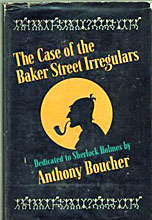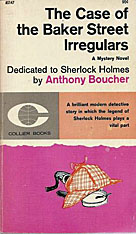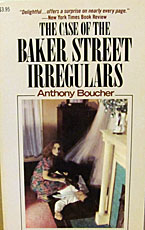Thu 21 Jul 2016
Mystery Review: ANTHONY BOUCHER – The Case of the Baker Street Irregulars.
Posted by Steve under Reviews[10] Comments

ANTHONY BOUCHER – The Case of the Baker Street Irregulars. Simon & Schuster, hardcover, 1940. Reprinted as Blood on Baker Street. Mercury #179, digest-sized paperback, abridged, 1953. Also published by Collier AS147, paperback, 1962; Gregg Press, hardcover, 1980; Carroll & Graf, paperback, 1986 & 1995.
In his early days as a mystery writer, renowned mystery critic Anthony Boucher was apparently much taken by the Ellery Queen school of detective puzzle writing, the more complicated the plot, the better. And as the title indicates, TCOT Baker Street Irregulars mixes in a quintuple dose of Sherlock Holmes as well.

There is a locked room mystery, codes to be deciphered — or should that be ciphers to be uncoded? — a large cast of characters, all trying to solve the mystery and all with (at the same time) alibis to be tested and broken, with ingenious solutions proposed by all and sundry, none of which hold up to the light of day — all with the zest and wit of an author who in his own way was a genius of the first rank indeed.
Dead is Stephen Worth, a hardboiled writer who hates Holmesian puzzles, but who has unaccountably been hired to write the screenplay for Metropolis Pictures’ latest project, that of filming their version of “The Adventure of the Speckled Band.” Protesting are all of the members of the Baker Street Irregulars around the country, five of whom are invited to come to Hollywood and be creative consultants on the project, mostly to keep them mollified and quiet.

Boucher’s most frequently used series character, Hollywood PI Fergus O’Breen is not on hand, but his sister Maureen is. She’s the trusted assistant to the head of Metropolis Pictures, and it becomes her job to keep an eye on the Irregulars (it was her idea, after all), all housed in one building. Who’s the housekeeper? None other than a young lady named Mrs. Hudson. Who’s the policeman who given the task of watching over the house after the murder occurs? None other than Sergeant Watson.
It is hard to keep the level of wackiness exhibited by the first third of the book going indefinitely, and the middle third sags noticeably, while the ending seems entirely too jerry-rigged to hold up against a bout of serious questioning. So I didn’t and I won’t. I just sat back and enjoyed it immensely. Not a book for modern readers, to be sure, but if your tastes are anything like mine, you’ll have a good time with this one too.
July 21st, 2016 at 2:03 pm
I read this years ago and have little memory of it, but I recall enjoying it.
July 21st, 2016 at 3:00 pm
I have thoroughly enjoyed everything I’ve read by Boucher, including this one.
No. I lied. The collaborative novel he did with SoCal MWA members (THE MARBLE ORCHARD, published under the group pseudonym “Theo Durrant”) was merely okay.
July 21st, 2016 at 7:33 pm
A favorite of mine, and lots of fun.
July 21st, 2016 at 8:49 pm
Jerry, Comment #2
If more than two are involved, I think collaborative novels are always more fun for the authors than they are for the reader.
July 21st, 2016 at 9:52 pm
I kept hoping Fergus would show up, but otherwise enjoyed this, wondering if there was a faint jab in there at Frank Gruber writing a Holmes movie or Leslie Charteris the radio series.
I feel sorry for modern readers if they can’t enjoy the screwball school Boucher and others did so well.
This is sort of a companion piece to ROCKET TO THE MORGUE, in that Boucher does for the Irregulars here what he did for SF fandom in ROCKET.
July 22nd, 2016 at 8:33 am
Like Jerry, I’ve enjoyed everything I’ve read by Anthony Boucher, especially his book reviews. Was there ever a better reviewer of mystery and crime fiction (other than David Vineyard, of course!). With the BOUCHERCON in New Orleans coming up in September, I might just go back and reread THE CASE OF THE BAKER STREET IRREGULARS.
July 22nd, 2016 at 9:38 am
Same Boucher who wrote SF? I’ve read some of that, but never his mysteries.
July 22nd, 2016 at 5:59 pm
I have the second one you show, and though I liked it, in a fun sense, I liked a couple of his others even better, such as Rocket to the Morgue.
July 22nd, 2016 at 9:19 pm
ROCKET TO THE MORGUE is, I suspect, the favorite Boucher novel of a good many people. Not only is it another good locked room mystery, but many of the characters are fictionalized versions of the SF writers who lived and worked in the Southern California area at the time, including Robert A. Heinlein and L. Ron Hubbard.
July 23rd, 2016 at 3:08 am
George Kelley,
Even getting mentioned in the same breath with Boucher is an honor. I won’t be able to wear a hat for weeks.